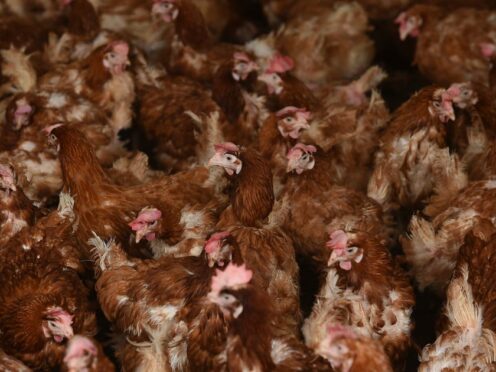
Scotland could become the first part of the UK to ban egg companies from keeping their chickens in cages.
The Scottish Government has just announced a new consultation on banning the use of cages to house hens involved in egg production.
And agriculture minister Jim Fairlie said if it was implemented Scotland would be “leading the way in improving the welfare of animals by being the first UK nation to ban the practice”.
The consultation comes after the use of battery cages for birds was banned in the UK at start of 2012.

However, there are still more than 1.1 million chickens in Scotland kept in “enriched cages”, which provide birds with more room to nest, roost and scratch than the smaller battery cages.
A survey in 2020 found that almost nine out of 10 people (88%) in the UK believe that using cages in farming is cruel, with more than three quarters (77%) supporting a complete ban on their use.
The Scottish Government’s preference is for a ban on the installation of new cages from 2023, with this followed by a complete ban on keeping birds in enriched cages from 2034.
Ministers believe this option “most effectively balances improvements in bird welfare and ensures sustainability for the laying hen sector”.
But the consultation also seeks views on banning the use of enriched cages from 2030, as well as a non-regulatory option, which would see shops and caterers to commit to stop selling and using eggs from birds kept in enriched cages by 2034.
Mr Fairlie said the Scottish Government’s most recent programme for government had included commitments “to improve the welfare of laying hens to ensure their confinement does not negatively impact their normal behaviours”.
He stated: “Significant progress has already been made in recognising the importance of animal welfare – both in government policies and the demand from the public in the choice they make when shopping.
“If implemented, the ban would be another example of Scotland leading the way in improving the welfare of animals by being the first UK nation to ban the practice.”
The minister added: “We’ve seen the European Union put forward legislation to prohibit using cages for all farmed livestock, with Luxembourg and Austria already banning them and others phasing them out.
“In the coming weeks we will also call for evidence on the use of cages in the gamebird and quail egg and meat sectors ahead of consulting on phasing out cages in those sectors in due course.
“I would encourage everyone with an interest in this issue to take part to help us shape how we protect the welfare of laying hens.”
Mark Borthwick, World Animal Protection policy manager said: “We’re pleased to see Scotland leading the way in consulting on the ban of cages for laying hens which are still in use in the UK.
“Enriched cages for laying hens will be banned in other countries including in Germany in 2025, in Czechia by 2027 and in Slovakia by 2030.
“France has banned the installation of any new cages. The UK is behind, and the other nations are slipping behind even further.
“It is time to end the use of cages which restrict animals’ natural behaviours and cause great suffering.
“It is important that these standards are also reflected in all trade deals with the UK to promote better welfare globally, and ensure we are leading the way for the billions of animals farmed each year.”

Enjoy the convenience of having The Sunday Post delivered as a digital ePaper straight to your smartphone, tablet or computer.
Subscribe for only £5.49 a month and enjoy all the benefits of the printed paper as a digital replica.
Subscribe